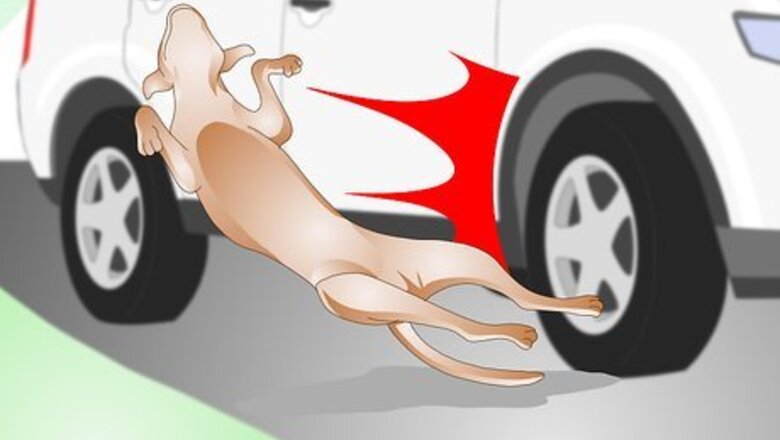
views
Identifying Symptoms of a Broken Bone
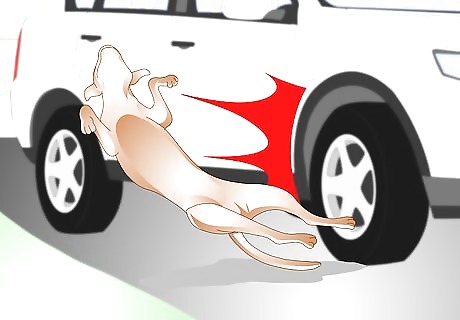
Consider recent events. Dogs can break bones as a result of being hit by a car, falling from a height, getting a leg caught in a hole, or from being stepped on (small dogs). Think about recent events that may have injured your dog. If your dog went missing for a few days and then came back limping, then there is a good chance that he was injured. If your dog has just been hit by a car or if he has other signs of a visible injury (bleeding, bone sticking out, etc.), then you need to take him to a veterinarian right away.
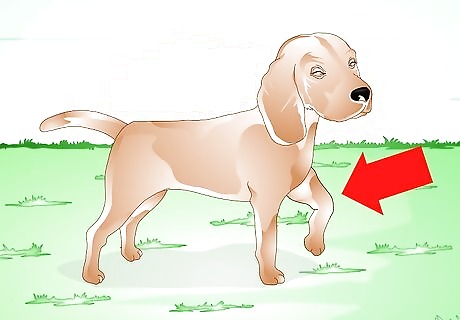
Watch for limping. Your dog may be trying to stay off of the affected leg or he may be favoring one side over another. If you notice that your dog is limping, then this is a strong indicator that he may have a broken bone. Your dog may also be avoiding walking at all if it hurts too much. If your dog is laying around more than is usual for him, then this can also indicate that something is wrong. Keep in mind that dogs may limp due to a broken bone in the leg, hips, or even the ribs.
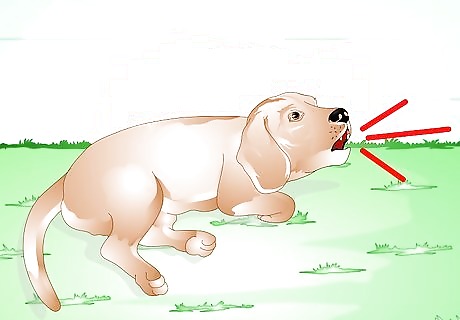
Check for other signs of pain. If your dog has a broken bone then he may whimper, yelp, or make other sounds to indicate that he is in pain. You may also notice him voicing his pain when he does normal daily activities, such as going up a step, laying down, sitting, or going to the bathroom.
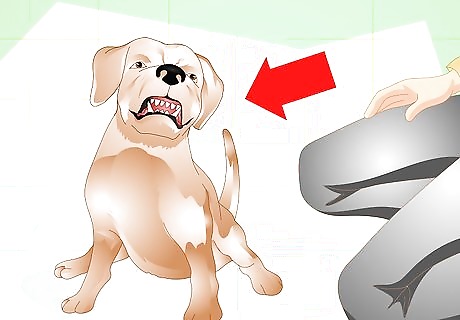
Pay attention to your dog’s behavior. Take notice if your dog starts acting in a strange way, such as by hiding or growling when someone approaches him. This change in behavior can be due to his pain and stress levels. You may need to muzzle your dog to prevent him from biting you or someone else in self-defense. Dogs may bite their owners if they are stressed or in pain.
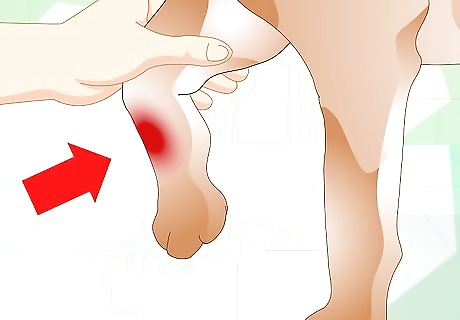
Note any redness or swelling. Swelling and redness can be indicative of a broken bone. An infection can also cause swelling and redness as well as feel hot to the touch.
Getting Veterinary Care for Your Dog
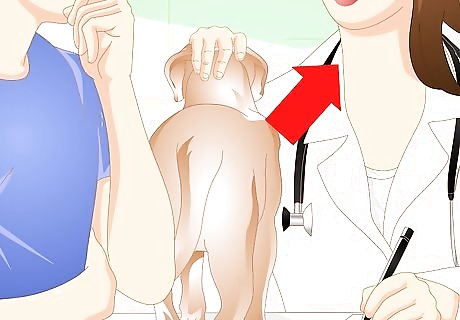
Take your dog to a veterinarian right away. If you suspect that your dog has a broken bone, then you will need to take him to see a veterinarian right away. Do not attempt to reset your dog’s broken bone by yourself and do not apply any antiseptics or other medicines to your dog’s broken bone. Try to keep your dog from moving around too much as you transport him to the veterinarian. You may want to place a blanket over him as well to keep him warm and comfortable.
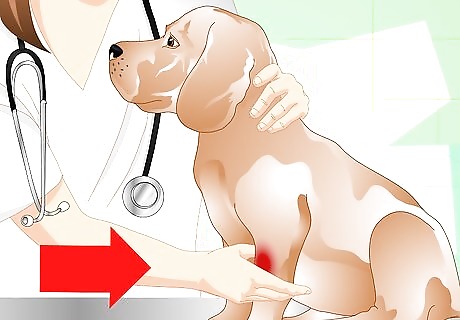
Allow your dog’s veterinarian to perform a physical exam. Your veterinarian will ask you some questions about your dog’s symptoms and check your dog for physical signs of a broken bone. During the exam, your dog will most likely need to be muzzled to prevent him from biting.
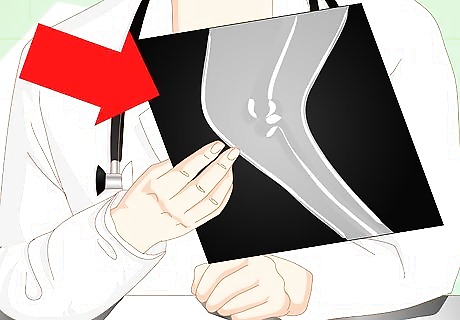
Get x-rays. If your dog’s veterinarian suspects that your dog has a broken bone, then x-rays will be necessary. X-rays can help the veterinarian evaluate the bones for a break, assess what type of break it is, and pinpoint its location. Although many breaks are obvious, there are certain types that are not as apparent—particularly when the are within the joints or in young, growing dogs with open growth plates. Your dog will be sedated for x-rays to help keep him still and reduce his pain. Fractures are classified as either complete or incomplete. A complete fracture is where the bone is separated in one or more places and an incomplete fracture is where the bone is bent and not fully separated.
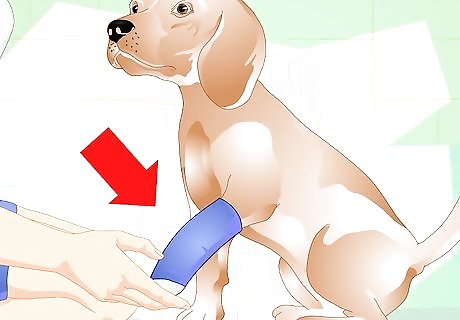
Determine if a cast is needed. If your dog has broken a leg, then a cast will be necessary to immobilize the broken bone and ensure that your dog’s limb heals properly. If a fracture is above your dog’s knee or elbow, then pins and metal plates may also be necessary to ensure proper healing.
Caring for Your Dog
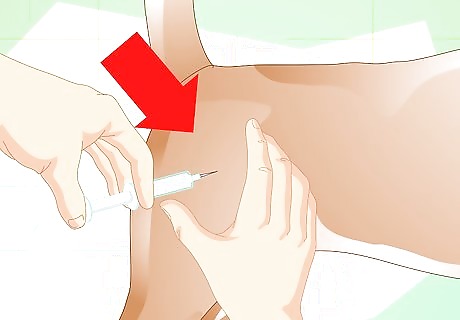
Give your dog medications as directed. Your veterinarian may prescribe some medications for your dog, such as painkillers and antibiotics. It is important to administer these medications for as long as your dog’s veterinarian says to do so. Do not stop your dog’s medication without asking your dog’s veterinarian first.
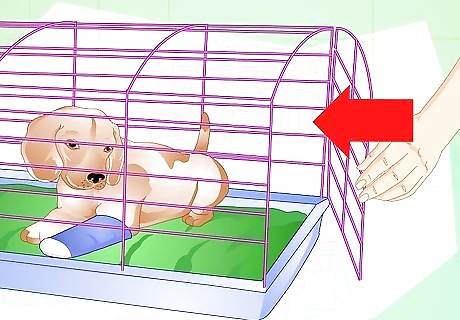
Limit your dog’s movement until he has healed. You may need to prevent your dog from moving around after he has been treated for a broken bone. One way to do this is to use a crate. You can use a crate to encourage your dog to rest for up to six weeks. If you have never used a crate with your dog before, then you will need to make sure that you: Get a crate that is large enough for your dog to stand up, turn around, and lay down in. Place some comfortable bedding in the crate, such as a couple of folded blankets or a dog bed. Do not leave your dog in the crate for more than a few hours at a time. You will need to let him out to go to the bathroom and to eat and drink as well. Never use a crate as punishment. Your dog should want to spend time in his crate, not fear it.
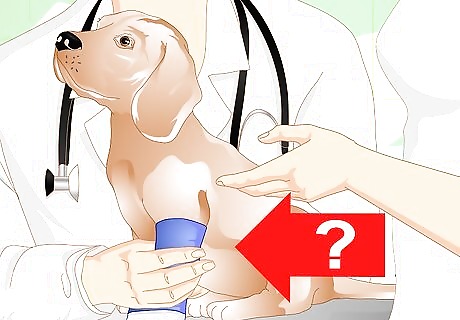
Find out how long it will take for your dog to heal. Make sure that you ask your veterinarian about how much time your dog will need before he can return to his normal activities. Your dog’s healing time will depend on the severity and type of break as well as your dog’s age. For example, if you have a puppy, then he may fully recover in about one month. If you have an older dog, it can take much longer.


















Comments
0 comment